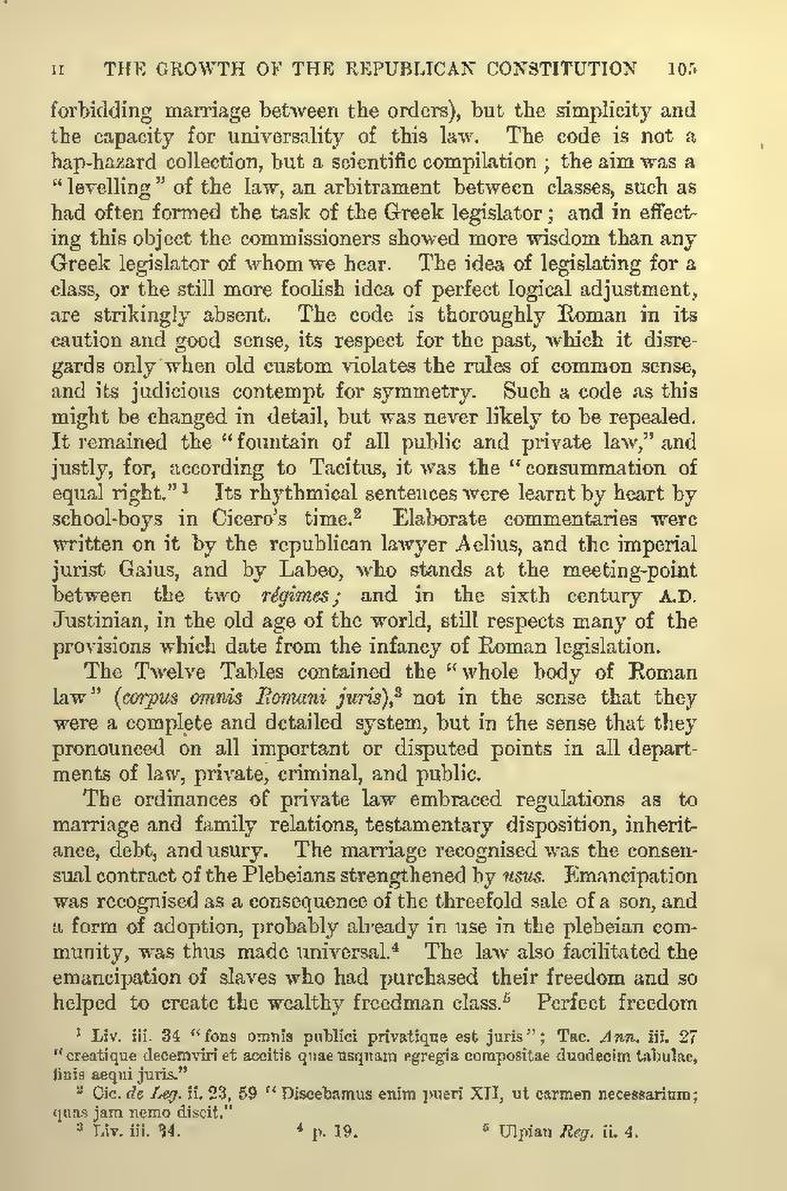forbidding marriage between the orders), but the simplicity and the capacity for universality of this law. The code is not a hap-hazard collection, but a scientific compilation; the aim was a "levelling" of the law, an arbitrament between classes, such as had often formed the task of the Greek legislator; and in effecting this object the commissioners showed more wisdom than any Greek legislator of whom we hear. The idea of legislating for a class, or the still more foolish idea of perfect logical adjustment, are strikingly absent. The code is thoroughly Roman in its caution and good sense, its respect for the past, which it disregards only when old custom violates the rules of common sense, and its judicious contempt for symmetry. Such a code as this might be changed in detail, but was never likely to be repealed. It remained the "fountain of all public and private law," and justly, for, according to Tacitus, it was the "consummation of equal right."[1] Its rhythmical sentences were learnt by heart by school-boys in Cicero's time.[2] Elaborate commentaries were written on it by the republican lawyer Aelius, and the imperial jurist Gaius, and by Labeo, who stands at the meeting-point between the two régimes; and in the sixth century A.D. Justinian, in the old age of the world, still respects many of the provisions which date from the infancy of Roman legislation.
The Twelve Tables contained the "whole body of Roman law" (corpus omnis Romani juris),[3] not in the sense that they were a complete and detailed system, but in the sense that they pronounced on all important or disputed points in all departments of law, private, criminal, and public.
The ordinances of private law embraced regulations as to marriage and family relations, testamentary disposition, inheritance, debt, and usury. The marriage recognised was the consensual contract of the Plebeians strengthened by usus. Emancipation was recognised as a consequence of the threefold sale of a son, and a form of adoption, probably already in use in the plebeian community, was thus made universal.[4] The law also facilitated the emancipation of slaves who had purchased their freedom and so helped to create the wealthy freedman class.[5] Perfect freedom
- ↑ Liv. iii. 34 "fons omnis publici privatique est juris"; Tac. Ann. iii. 27 "creatique decemviri et accitis quae usquam egregia compositae duodecim tabulae, finis aequi juris."
- ↑ Cic. de Leg. ii. 23, 59 "Discebamus enim pueri XII, ut carmen necessarium; quas jam nemo discit."
- ↑ Liv. iii. 34.
- ↑ p. 19.
- ↑ Ulpian Reg. ii. 4.
